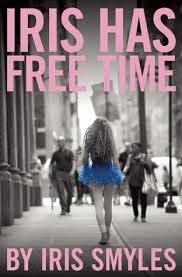Books & Culture
Review: Iris Has Free Time, by Iris Smyles

A darkly comic, affecting portrait of a 20-something with literary ambitions

Some stories set in New York seem so instantly familiar that they might as well be their own genre, as rigidly coded as the western, or the Gothic horror tale. You know the New York story I’m talking about: jaded but immature youngsters want to be artists, care very deeply about seeming to care very deeply about exhibits and plays, and date one another neurotically — all presented in a satirical tone.
Iris Smyles’s Iris Has Free Time follows a young woman named Iris through her 20s as she does many of the things one expects a 20-something-year-old New Yorker to do in a novel like this: she adapts to college life — roommate, academics, the city; she interns at The New Yorker; she works on an autobiographical novel and hunts half-heartedly for a “real” job; she dates a slew of eccentric, self-centered guys; she attends a “humanities” graduate program and teaches freshmen; she starts a literary journal, blogs, and writes a sex column; she travels to Europe with a boyfriend. And she drinks, and drinks, and drinks.
Iris Has Free Time is a shaggy dog story, in accordance with Iris’s wish to live “plotlessly.” No one conflict overarches this novel; instead, Smyles constructs a portrait of youth by focusing on smaller moments — “stories of tragic dailyness,” as the narrator might put it.
That aforementioned narrator is Iris herself, who tells her story in alternating tones — sometimes cynical and snotty, sometimes yearning and vulnerable — while dropping references to cultural detrita both high and low, ranging from The Odyssey and Rebecca to Sex and the City and The Real World. Smyles takes the novel’s epigraph not from Dante, but from “Spark Notes: Dante’s Inferno” — literary, but irreverently so.
I don’t really need to tell you anything else, do I? You already know whether you’ll like this book. No doubt you have noticed that the author and the narrator have the same name, thus the novel surely leans toward metafictive autobiography; is that all right with you? Do you watch Girls and relate? Do you enjoy the occasional Sloane Crosley essay? If “yes,” then this blurb from Annie Hall herself, Diane Keaton, says everything you need to know: “You will love this book.”
Boy oh boy, did I try to resist Iris Has Free Time. In my defense, the prologue drags a bit (with the exception of an absurd visit to a job fair, at which Iris arm-wrestles “The Maxim Man”), and Smyles indulges in a few too many clichés of the contemporary bildungsroman. But eventually — goddamn it — the book began to charm me in ways I hadn’t expected.
Iris Has Free Time convinces in its details, especially throughout the section that covers Iris’s time in a graduate program, where there are copies of AWP Magazine everywhere. When teaching, Iris asks her freshmen students to “grade themselves” at the end of the semester. As a writer, Iris mostly just moves around punctuation, as though crafting a short story is like solving a sliding puzzle. At one point, Iris goes on a date with a writer who is famous for his memoirs about his own alcoholism; at the memoirist’s suggestion, they meet for drinks. The novel understands the silliness of its literary/academic subjects very well.
Most of the supporting characters who orbit Iris are fascinating: a character named The Captain has just sued a 90s TV star for relatively picayune reasons; a character named Felix is first shown smoking a joint and watching Soul Train one morning in an apartment that isn’t his, and at which he didn’t necessarily have permission to crash. Smyles has a real knack for establishing characters quickly with one or two off-kilter details. Even most of those bildungsroman clichés I mentioned before are twisted in surprising ways (Iris’s trip to Europe, which would lead to an epiphany in most novels, climaxes with an embarrassing incident of sloshed urination).
Iris Has Free Time never settles into a consistent style, and each portion has its own narrative logic. Some sections — like a brief chapter involving the sexual uses of Chinese finger cuffs — read like perfect short stories.
Even as the book refuses to fall into conventional narrative patterns, a couple of strong emotional anchors keep it from floating into abstraction — primarily, Iris’s understated battle with her drinking problem, and her friendship with her college roommate, May. By the end of the book, Iris and May are in their late 20s, and one of them is engaged, while the other is finally reading Swann’s Way. “My missed opportunities were still ahead,” remarks Iris, thinking back on her early 20s. They seem to have grown up.
But Smyles’s tacit question, which hides in her acknowledgement of adulthood’s bittersweet nature, is this: Are missed opportunities always still ahead? And if so, should this fact frighten, or amuse? “I think I might be depressed,” Iris muses. “Either that or I’m very happy. It’s hard to tell.” I felt this way in the end, leaving me with the sensation that Iris Has Free Time is really a book about me. And, like Iris, I totally enjoy stuff about me — even if at first I pretend not to.
Recommended if you enjoyed: Indecision by Benjamin Kunkel, The Girls’ Guide to Hunting and Fishing by Melissa Bank, The Marriage Plot by Jeffrey Eugenides
***
— Benjamin Rybeck’s reviews have also appeared in V Magazine. His fiction has received “special mention” and “notable reading” distinctions from The Pushcart Prize Anthology and The Best American Nonrequired Reading, respectively.









